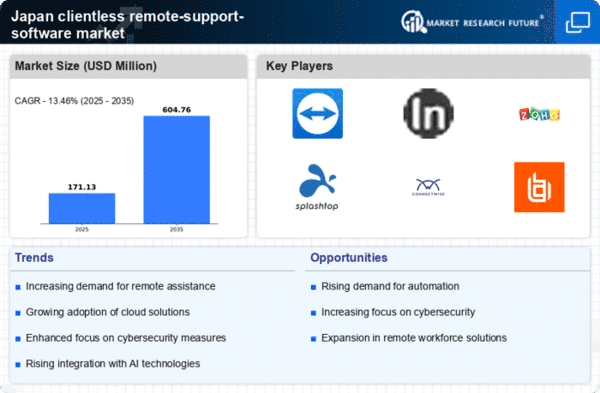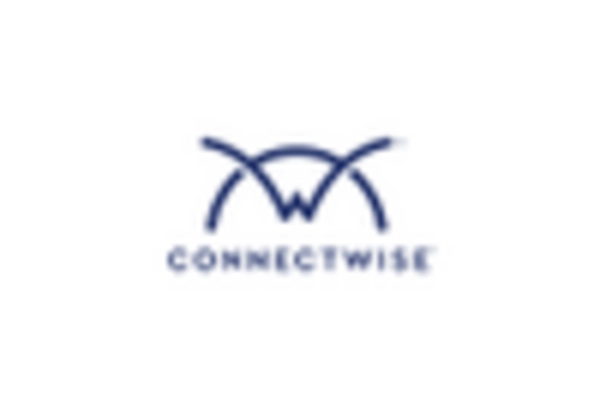Growing Emphasis on Cost Efficiency
Cost efficiency emerges as a pivotal driver for the clientless remote-support-software market in Japan. Organizations are increasingly seeking solutions that minimize operational costs while maximizing support capabilities. The ability to provide remote assistance without the need for extensive hardware or software investments is particularly attractive. Recent studies indicate that companies utilizing clientless remote-support solutions can reduce support costs by up to 30%, making it a financially viable option for many businesses. This focus on cost-effectiveness aligns with the broader trend of digital transformation, where organizations aim to streamline processes and enhance service delivery. As a result, the clientless remote-support-software market is likely to witness sustained growth as businesses prioritize solutions that offer both functionality and affordability.
Increased Focus on Customer Experience
The clientless remote-support-software market in Japan is significantly influenced by the increasing focus on customer experience. As businesses strive to differentiate themselves in a competitive landscape, providing exceptional support services becomes paramount. Companies are recognizing that efficient and effective remote support can enhance customer satisfaction and loyalty. Data suggests that organizations that invest in clientless remote-support solutions report a 25% increase in customer retention rates. This trend underscores the importance of responsive and accessible support channels, which are essential for meeting customer expectations. By leveraging clientless solutions, businesses can ensure that customers receive timely assistance, thereby fostering positive relationships and driving repeat business. Consequently, the clientless remote-support-software market is likely to thrive as organizations prioritize customer-centric strategies.
Rising Demand for Remote Work Solutions
The clientless remote-support-software market in Japan is experiencing a notable surge in demand as organizations increasingly adopt remote work policies. This shift is driven by the need for efficient collaboration tools that facilitate seamless communication and support across dispersed teams. According to recent data, Approximately 70% of Japanese companies are implementing remote work strategies, highlighting the necessity for robust remote-support solutions. As businesses seek to enhance productivity and maintain operational continuity, the clientless remote-support-software market is poised for growth. The ability to provide immediate assistance without requiring software installation is particularly appealing, as it reduces barriers to access and enhances user experience. This trend indicates a significant opportunity for vendors to innovate and cater to the evolving needs of the workforce. Ultimately, this will drive market expansion.
Regulatory Compliance and Data Protection
Regulatory compliance and data protection are increasingly critical factors influencing the clientless remote-support-software market in Japan. With the implementation of stringent data protection laws, businesses are compelled to adopt solutions that ensure compliance while safeguarding sensitive information. The clientless nature of these support tools allows organizations to maintain control over data security, as they do not require the installation of third-party software that may pose risks. As of November 2025, approximately 60% of Japanese companies prioritize compliance with data protection regulations, driving the demand for secure remote support solutions. This focus on regulatory adherence not only mitigates risks but also enhances customer trust. It positions the clientless remote-support-software market for continued growth as businesses seek reliable and compliant support options.
Technological Advancements in Connectivity
Technological advancements in connectivity play a crucial role in shaping the clientless remote-support-software market in Japan. The proliferation of high-speed internet and mobile networks has enabled users to access remote support services with greater ease and reliability. As of November 2025, Japan boasts one of the highest internet penetration rates globally, with over 90% of the population connected. This widespread connectivity facilitates the adoption of clientless solutions, as users can receive support from virtually anywhere. Furthermore, advancements in network security protocols ensure that remote support sessions are conducted safely, addressing concerns related to data privacy. Consequently, The clientless remote-support-software market is likely to benefit from these technological improvements. They enhance the overall user experience and foster greater trust in remote support services.
















